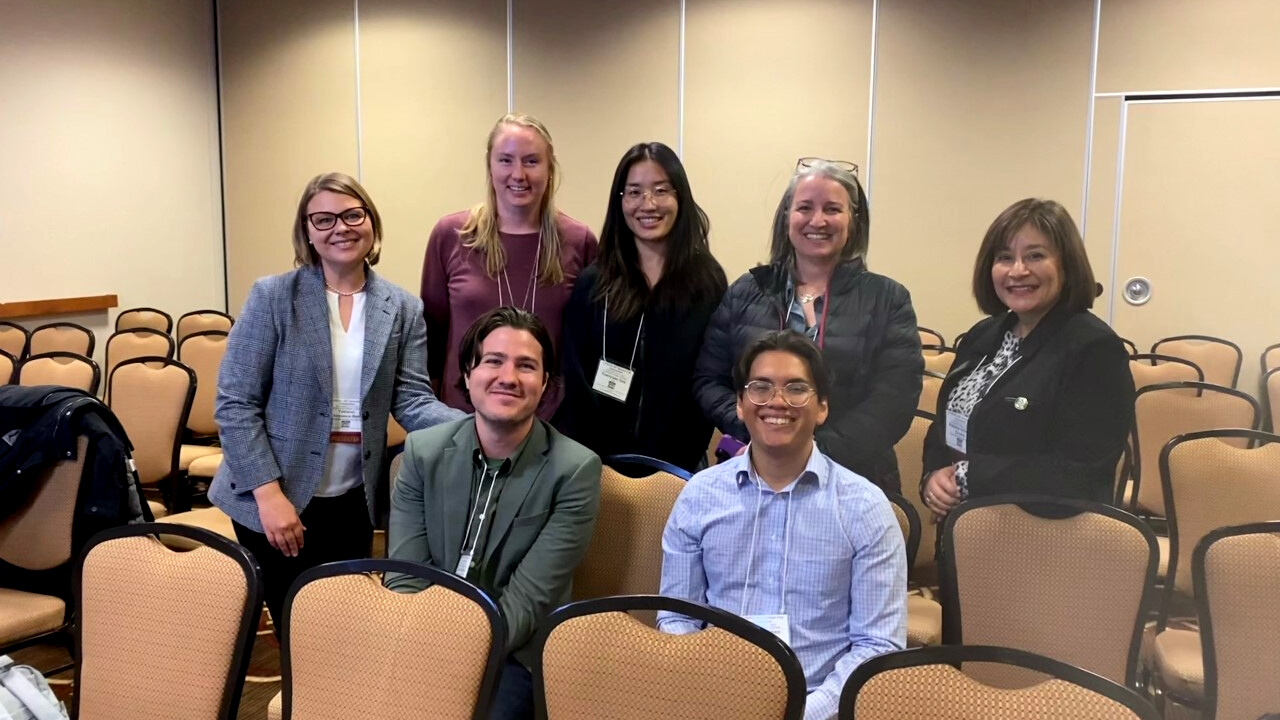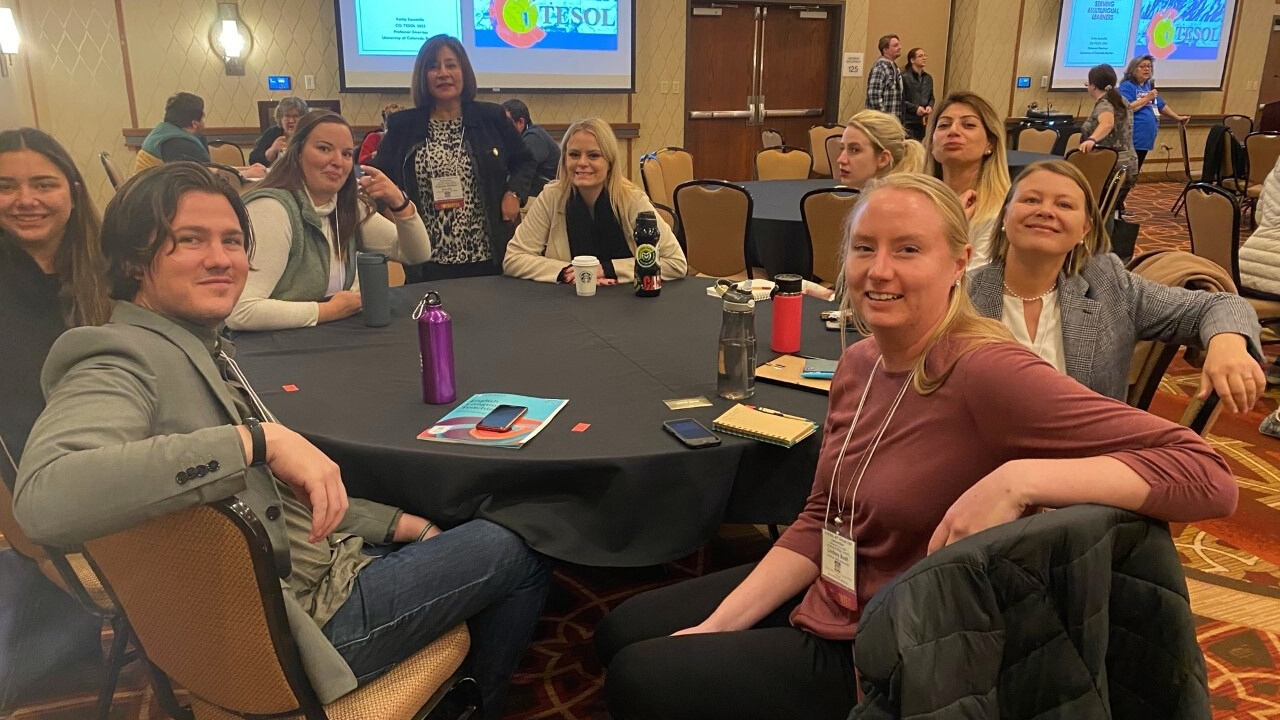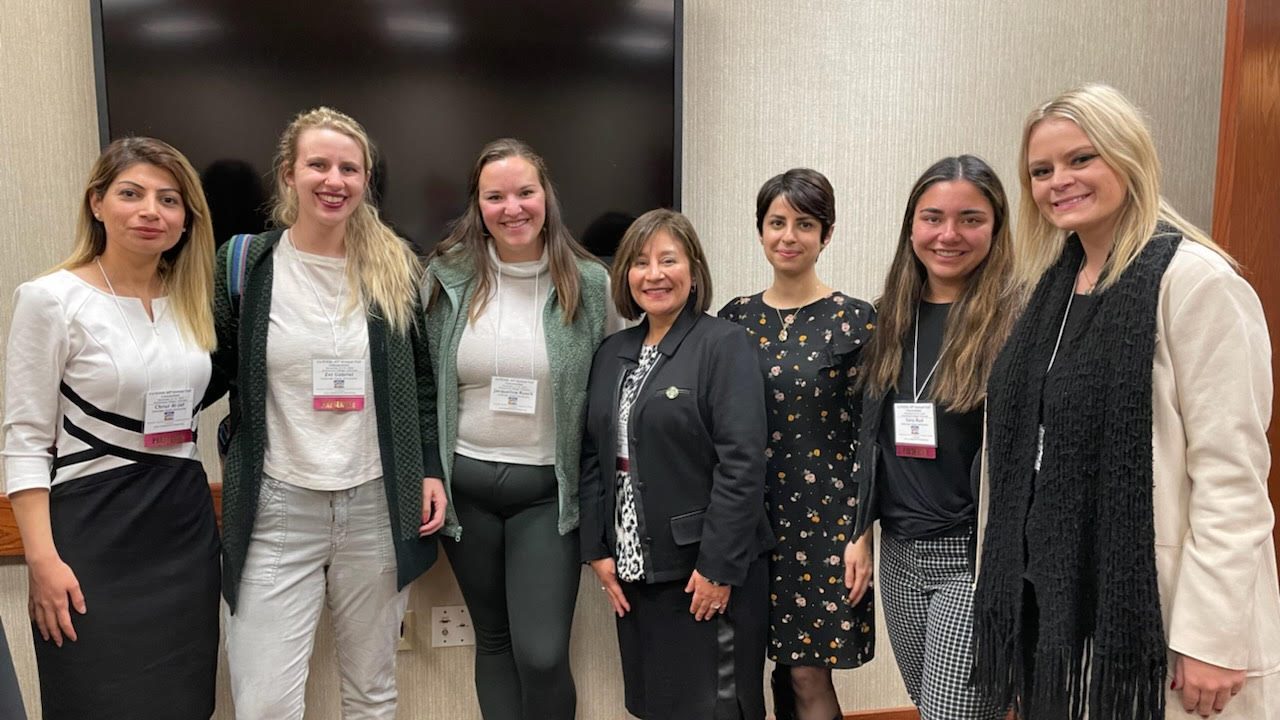Last month, five graduate students and an alumna of the Department of English’s TEFL/TESL program presented their research alongside department faculty in Denver at the annual convention of Colorado Teachers of English to Speakers of Other Languages (CoTESOL).
A non-profit 501(c)3 organization that supports English language teachers in Colorado, CoTESOL brings together a dynamic group of educators each fall who are involved in the many different aspects of language learning and bilingual education.
Lindsey Bush, a recent alumna of the TEFL/TESL program who is now pursuing a PhD at CSU in Education, Equity, and Transformation chose to present on adapting curriculums for adult English learners. Her proposal, “Choose Your Curriculum: 3 States, 3 Programs, 1 Goal” sprang from her own experiences teaching English and being a part of curriculum decisions in three different states in the past three years.
“Because of the pandemic, along with other factors, I was asked to work on curriculum decisions in each of these programs,” Bush said. “This is pretty rare – generally as teachers we are assigned a curriculum by the administration, or we spend a long time in switching curriculums. However, in this perfect storm moment, each of the programs I worked for needed to revise their curriculum substantially and I got to be a part of those decisions. I was really interested in how curriculum decisions are made overall, but especially now that education has needed to adapt so much.”
By reconnecting with former co-workers to discuss this topic, Bush found that in the three different programs she taught at across Colorado, New York, and Massachusetts, the main goal remained the same for her and her colleagues: create tangible success for all students.
“I think education is in a state of constant flux and particularly now there are enormous opportunities to make progress on making education accessible to everyone,” Bush said.
A collaborative and supportive community
For current and prospective TEFL/TESL students interested in presenting at CoTESOL in the future, Bush only had positive things to say about her experience this year.
“It’s great to hear what people are doing in the field, as well as getting techniques from educators already doing different work,” Bush said. “Often ESL teachers especially may feel like they don’t have a lot of support, because there tend to be fewer ESL teachers in a district. So, getting to spend time in conversation with other ESL educators always feels affirming.”
Sarah Howard, who is in her second year of the program and currently applying to PhD programs, agreed that the experience was invaluable – especially from a professional development perspective.
“It’s essential for me to have presentations on my curriculum vitae and have experience networking and meeting other people in the field,” Howard explained.
When it came to such networking, no one was a more supportive cheerleader than Professor Fabiola Ehlers-Zavala.
“Oh, she was introducing us to everyone under the sun,” Howard said. “Especially since [Ehlers-Zavala] is a president of the American Association for Applied Linguistics. She knows everyone.”
Howard credits her mentors – including Ehlers-Zavala, and associate professors Tatiana Nekrasova-Beker and Tony Becker – as being instrumental in helping her develop the research that led to her CoTESOL proposal.
While taking E527 – Theories of Foreign/ Second Language Learning last spring with Dr. Nekrasova-Beker, Howard became deeply interested in understanding second language acquisition through a sociocultural lens.
“Basically, sociocultural theory is a way to facilitate learning that is through social interactions and mediation. So instead of seeing language learning as a cognitive process where some students get it and some don’t, this idea argues that acquisition is influenced by social environment, and how learners are interacting within it,” Howard described.
In her proposal, Howard created a “pedagogical realization” that included lesson plans and activities for teachers to use in the classroom to facilitate learning within this theoretical framework.
“It’s been a lot of fun,” Howard said. “In diving into this research, I’ve really grown passionate about this theory and the holistic analysis it applies.”
In addition to Howard, current TEFL/TESL graduate students Zel Gabriel, Sara Rad, Katayoun Hashemin, and Chnur Al-Jaf also presented at this year’s CoTESOL.
TESL/TEFL Student Association
When Howard isn’t working on her thesis or as a teaching assistant in CSU’s Programs for Learning Academic and Community English (PLACE), she’s helping reinstate the TESL/TEFL Student Association as acting president. While meetings of this graduate student organization had been temporarily on hold during the pandemic, Howard worked to revitalize the group last spring and now they typically meet biweekly – offering professional development opportunities, round-table discussions, and more for current students.
For example, before CoTESOL, students had the opportunity to practice their proposals during a meeting in front of their peers and faculty advisors. Other activities have included faculty members offering sessions on applying to PhD programs and best practices for conducting research in the field of applied linguistics. Additionally, the organization holds fundraising efforts for students to travel and present at various conferences across the country.
The TESL/TEFL Student Organization’s next professional development opportunity will be held on December 5th, from 4:00-5:00 p.m. in the Lory Student Center (Room 312). At the meeting, students will host a presentation from Dr. Fabiola Ehlers-Zavala and Dr. Maite Correa entitled, “A Round-Table Conversation with Dr. Maite Correa: Tips for Preparing to Lead as an Academic Director of a Language Program.”


